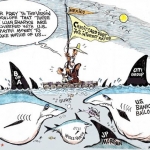Explore Publications
The Justice Department is increasing its prosecutions of alleged acts of foreign bribery by U.S. corporations, forcing them to take costly steps to defend against scrutiny. The crackdown under the Foreign Corrupt Practices Act, or FCPA -- a post-Watergate law largely dormant for decades -- now extends across five continents and penetrates entire industries.
Read MoreFrance's new naval base in Abu Dhabi, its first overseas military base in 50 years, has sparked a round of lobbying on behalf of lucrative business for French companies including Dassault, the military aircraft maker, and a consortium of Total, GdF-Suez and Areva, which is bidding to build two nuclear power stations in the UAE. Dassault is hoping to sell as many as 60 of its Rafale fighters to the UAE.
Read MoreA nonprofit organization, Neighborhood Assistance Corp. of America, or NACA, has emerged as one of the loudest scourges of the banking industry in the post-bubble economy. Though some bankers privately deplore his tactics, NACA's Bruce Marks is a growing influence in the lending industry and the effort to curb foreclosures.
Read MoreA study by Greenpeace and several other environmental groups has concluded that Royal Dutch Shell's carbon intensity will rise 85 per cent as it develops its oil and gas fields in the coming years. Campaigners warn Shell's investors that this disadvantages the company vis a vis its peers as US and European policymakers move towards a broad cap-and-trade system to limit carbon emissions. Shell's growing carbon intensity stems from its resource base, which is heavily made up of Canadian oil and Nigerian gas.
Read MoreAnnual meeting will face an outcry from shareholders and campaigners over boardroom bonuses and pollution record
The worldwide financial crisis is hitting people in the Global South with particular venom, and disaster profiteering is alive and well. Take Mexico. While entities like Citigroup-owned Banamex get away with charging Mexican credit account-holders usurious interest rates of up to 100 percent, Banamex itself turned nearly $1 billion in profits in 2008.
Read MoreTexaco, the American oil company that Chevron acquired in 2001, once poured oil waste into pits used decades ago for drilling wells in Ecuador's northeastern jungle. Texaco's roughnecks are long gone, but black gunk from the pits seeps to the topsoil here and in dozens of other spots. These days the only Chevron employees who visit the former oil fields do so escorted by bodyguards toting guns. They represent one side in a bitter fight that is developing into the world's largest environmental lawsuit, with $27 billion in potential damages.
Read MoreWhen Chevron learned that "60 Minutes" was preparing a potentially damaging report about oil company contamination of the Amazon rain forest in Ecuador, it hired a former journalist to produce a mirror image of the report, from the corporation's point of view. An Ecuadorean judge is expected to rule soon on whether Chevron owes up to $27 billion in damages.
Read MoreThe trustee gathering assets for the victims of Bernard L. Madoff's fraud has sued a prominent New York City hedge fund investor, J. Ezra Merkin, to recover almost $500 million withdrawn from Madoff accounts in the last six years.
Read MoreRoyal Dutch Shell is facing the risk of a shareholder rebellion over pay for the second successive year after two influential investor advisory groups raised concerns about discretionary pay awards made to board-level executives.
Read More